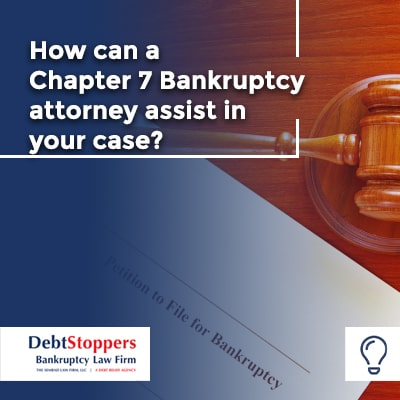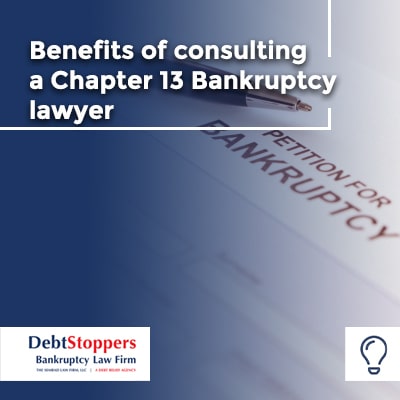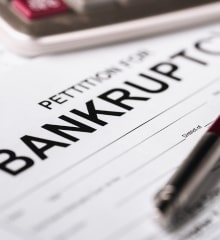What is the difference between chapter 7 and chapter 13 Bankruptcy?

Chapter 7 and Chapter 13 bankruptcy are two of the most common types of bankruptcy available to individuals facing overwhelming debt. Both options have a distinct process, qualifications, and outcomes. Here’s a breakdown of each and the main differences between them.
What is Chapter 7 Bankruptcy?
Chapter 7 bankruptcy is sometimes called “liquidation bankruptcy,” because it allows individuals to discharge all their qualified unsecured debts including credit card balances, medical bills, and personal loans.
Chapter 7 bankruptcy involves a bankruptcy trustee who may sell certain non-exempt assets to repay creditors. However, many filers can keep most of their essential property under state or federal exemption laws. The process typically takes about three to six months from filing to discharge.
However, not everyone qualifies for Chapter 7. Filers must pass a means test, which evaluates whether their income is low enough to warrant Chapter 7 rather than Chapter 13.
What is Chapter 13 Bankruptcy?
Chapter 13 bankruptcy is also called “reorganization bankruptcy” because it allows individuals to retain their assets and repay debts through a court-approved repayment plan over three to five years.
With Chapter 13, you propose a payment plan to pay creditors based on your income, living expenses, and types of debt. This plan must be approved by the bankruptcy court, and individuals make monthly payments to a trustee, who distributes the funds to creditors. The repayment period typically lasts three to five years, after which remaining eligible debts may be discharged.
What are the main differences between Chapter 7 and Chapter 13 Bankruptcy?
Chapter 7 may be a better fit if you have limited assets and primarily unsecured debts, you need a faster, straightforward path to debt discharge, you pass the means test, and don’t have enough income for a repayment plan.
Chapter 13 may be better if you have a steady income and want to protect assets like your home or car, you need to catch up on secured debts that aren’t dischargeable, and you want to avoid liquidation of non-exempt assets.
Both Chapter 7 and Chapter 13 bankruptcy have significant effects on credit and future financial planning, so it is wise to consult a bankruptcy attorney to assess which type is best for your specific situation.
Debt discharge & Repayment plans
Both Chapter 7 and Chapter 13 have advantages depending on your financial circumstances. Chapter 7 provides a quicker debt discharge but may involve asset liquidation, while Chapter 13 offers additional asset protection and a structured repayment plan, with discharge occurring after completion of the plan.
Eligibility Requirements
Chapter 7 requires that you pass a means test, if you do not pass the means test, Chapter 13 may be better suited for you.

How can a Chapter 7 Bankruptcy attorney assist in your case?
A Chapter 7 bankruptcy attorney can play a crucial role in guiding you through the bankruptcy process, ensuring that your rights are protected, and helping you achieve the best possible outcome.
First, an attorney will evaluate your financial situation and determine if Chapter 7 is the right option for you, or if another type of bankruptcy might be more appropriate.
Chapter 7 requires passing a means test, which assesses whether your income and expenses qualify for Chapter 7. An experienced bankruptcy attorney helps you complete this complex test accurately and advises you on alternatives if you don’t qualify. Your attorney will gather all necessary documents, including income statements, tax returns, asset lists, and debt information, to prepare an accurate and complete petition.
Filing for bankruptcy requires detailed paperwork, including schedules of assets, liabilities, income, and expenses. Your attorney prepares this petition to avoid errors that could lead to delays or complications. Additionally, an attorney will know federal and state exemption laws and will apply these to protect as many assets as possible, such as your home, car, retirement accounts, and essential household items.
Once you file, an automatic stay prevents creditors from contacting you or continuing collection efforts. If creditors violate the automatic stay by attempting to collect a debt, your attorney can intervene to stop these actions or even seek damages on your behalf if necessary.
After filing, you must attend a 341 meeting or meeting of creditors. Your attorney prepares you for the trustee's questions and ensures you are ready to present your financial situation. The trustee may ask questions about your debts, assets, and income at the meeting and your attorney will help you address any concerns raised by the trustee or creditors.
Certain debts like recent tax debts, alimony, and child support are typically non-dischargeable. Your attorney will identify these and help you understand what obligations remain post-bankruptcy. Your attorney will also help you create a plan for managing non-dischargeable debts after your bankruptcy is complete, so you can maintain financial stability.
When to seek help from a Chapter 7 Bankruptcy attorney
You should seek help from an experienced bankruptcy attorney as soon as possible. The earlier you act, the more they can help. Some people say you should consider bankruptcy as a last resort - but that’s not correct. Many of your assets are protected, and an attorney can help you protect your assets and get a fresh financial start.
If you cannot manage your debt, you should contact an attorney for a free evaluation and consultation.
Role of the attorney for your debt discharge
An attorney plays a critical role in guiding you through the debt discharge process in bankruptcy, ensuring you meet legal requirements, avoid errors, and achieve the best possible outcome.
How can a Chapter 13 Bankruptcy lawyer support your case?
A Chapter 13 bankruptcy attorney plays a key role in helping you navigate the complexities of filing, establishing a repayment plan, and successfully completing your bankruptcy case.

Benefits of consulting a Chapter 13 Bankruptcy lawyer
A bankruptcy lawyer will assess your financial situation to confirm that Chapter 13 is the right option, comparing it to alternatives like Chapter 7 or debt consolidation. They help you determine which debts are priority, secured, or unsecured, which affects how your repayment plan is structured.
Bankruptcy laws are complex, with strict rules on eligibility, debt limits, and filing requirements. An attorney ensures compliance with these rules, helping you avoid errors that could lead to case dismissal.
Filing for Chapter 13 can help you prevent foreclosure or repossession of assets like your home or car by including missed payments in the repayment plan. Your attorney also helps you structure the plan to protect these assets. An experienced lawyer also knows how to use federal or state exemptions to protect as many assets as possible, minimizing what you risk losing. Additionally, your lawyer can negotiate with creditors to potentially reduce interest rates or payments on secured and unsecured debts within the court-approved plan.
Creditors or the trustee may raise objections to parts of your repayment plan. Having an experienced attorney in Chapter 13 who will advocate for you and work to resolve objections will help keep the case moving smoothly. Throughout the process, your lawyer is a reliable source of information and advice for you; an attorney will help, ensure you understand each step and are prepared for what’s next.
Role of the lawyer for your repayment plans
An attorney will assess your income, expenses, and debts to create a payment plan that is manageable while also meeting bankruptcy court requirements. Additionally, your lawyer helps allocate your payment toward debts like taxes and child support, secured debts, and unsecured debts. Simply put, your lawyer will help ensure your repayment plan is structured to avoid putting excessive strain on your budget.
Filing a repayment plan requires detailed documentation. Your lawyer prepares this plan, which includes your income, expense breakdown, and how much of your debt you will have to pay over the repayment period of three to five years.
The bankruptcy court must approve your repayment plan. The lawyer presents it on your behalf, ensuring it meets legal standards and arguing in favor of its feasibility if creditors or the trustee object. In some cases, the lawyer may be able to negotiate to reduce certain debt payments within the plan, potentially securing lower interest rates or negotiating more favorable terms. For secured debts, your attorney can help spread past-due amounts over the life of the plan, allowing you to catch up gradually without risking foreclosure or repossession.
Filing for Chapter 13 enacts an automatic stay, which halts creditor collection efforts. If any creditor violates this stay, your lawyer can intervene, taking legal action to enforce the stay and prevent further harassment. The automatic stay is particularly valuable in stopping foreclosure or repossession proceedings. Your lawyer ensures that your assets are protected while the repayment plan is active.
If your financial situation changes during the repayment period, your lawyer can help request a modification of your plan to reflect the new circumstances. Chapter 13 allows for some flexibility within the repayment plan, and your lawyer will know how to adjust the plan to help you remain compliant with the court's requirements even if circumstances change.
At this required meeting, creditors and the trustee can ask questions about your finances and the repayment plan. Your lawyer will prepare you for these questions and represent your interests during the meeting. If the trustee or creditors challenge parts of your plan, your lawyer presents evidence and arguments to support it, addressing any issues to keep the case on track.
Your lawyer helps you understand the importance of making each payment on time and complying with all plan requirements. Upon successful completion of the plan, your lawyer ensures the court issues a discharge order, which releases you from further liability on discharged debts, giving you a fresh financial start.
A Chapter 13 bankruptcy lawyer provides crucial support throughout the repayment plan, offering knowledge, protection, and guidance every step of the way. They ensure your plan is feasible, legally compliant, and properly structured to protect your assets and minimize stress, making a challenging process more manageable and increasing your chances of financial recovery.





